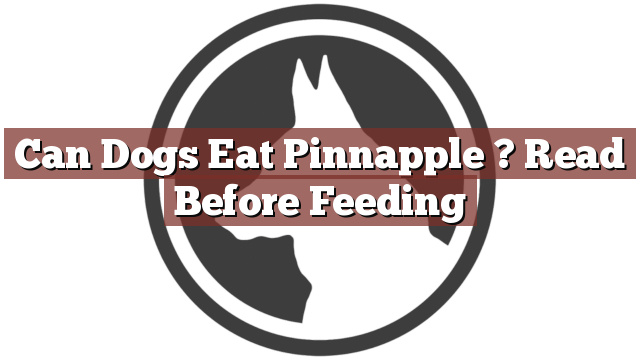Understanding Your Dog’s Dietary Needs
As a responsible dog owner, it is important to understand your furry friend’s dietary needs. While dogs are primarily carnivores, they can also benefit from certain fruits and vegetables in moderation. A balanced diet is crucial for their overall health and well-being. However, it is essential to be well-informed about which human foods are safe for dogs and which ones should be avoided.
Can Dogs Eat Pineapple? Read Before Feeding
Can dogs eat pineapple? This is a common question among dog owners who want to offer their pets a variety of treats. The answer is yes, dogs can eat pineapple in moderation. Pineapple is a delicious tropical fruit that is packed with essential vitamins and nutrients. It is a great source of vitamin C, manganese, and dietary fiber. These nutrients can benefit your dog’s immune system, bone health, and digestion.
Pros and Cons of Feeding Pineapple to Dogs
Feeding pineapple to your dog can have various advantages and disadvantages. Let’s explore the pros and cons:
Pros:
- Nutritional Value: Pineapple contains essential vitamins and minerals that can be beneficial for your dog’s overall health.
- Antioxidant Properties: The presence of antioxidants in pineapple can help fight inflammation and boost your dog’s immune system.
- Digestive Aid: The natural enzymes found in pineapple, such as bromelain, can aid in digestion and improve nutrient absorption.
Cons:
- High Sugar Content: Pineapple is relatively high in natural sugars. Feeding excessive amounts to your dog can lead to weight gain and other health issues.
- Potential Allergies: Some dogs may have allergies or sensitivities to pineapple. It is important to introduce new foods gradually and monitor your dog for any adverse reactions.
- Digestive Issues: While pineapple can aid digestion for some dogs, it may cause stomach upset, diarrhea, or gas in others. It is best to start with small quantities and observe your dog’s reaction.
Conclusion: Considerations for Feeding Pineapple to Your Dog
In conclusion, dogs can eat pineapple, but it is essential to do so in moderation and with caution. Before introducing any new food into your dog’s diet, it is recommended to consult with your veterinarian. They can provide guidance based on your dog’s specific needs and health conditions. Additionally, always ensure to remove the tough core and any thorny parts from the pineapple before feeding it to your furry friend. By understanding your dog’s dietary needs and making informed choices, you can provide them with a safe and enjoyable treat like pineapple.
Thank you for taking the time to read through our exploration of [page_title]. As every dog lover knows, our furry friends have unique dietary needs and responses, often varying from one canine to another. This is why it's paramount to approach any changes in their diet with caution and knowledge.
Before introducing any new treats or making alterations to your dog's diet based on our insights, it's crucial to consult with a veterinarian about [page_title]. Their expertise ensures that the choices you make are well-suited to your particular pet's health and well-being.
Even seemingly harmless foods can sometimes lead to allergic reactions or digestive issues, which is why monitoring your dog after introducing any new food item is essential.
The content provided here on [page_title] is crafted with care, thorough research, and a genuine love for dogs. Nevertheless, it serves as a general guideline and should not be considered a substitute for professional veterinary advice.
Always prioritize the expert insights of your veterinarian, and remember that the health and happiness of your furry companion come first.
May your journey with your pet continue to be filled with joy, love, and safe culinary adventures. Happy reading, and even happier snacking for your canine friend!

